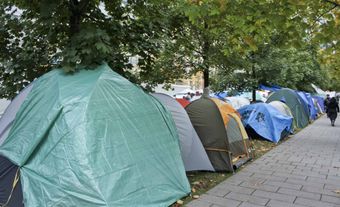Women's Studies
The first few courses in Women's Studies were taught at Canadian universities in the early 1970s. Since that time, the field has grown to the point where most universities now have some offerings in Women's (or Feminist) Studies, ranging from courses within various departments to undergraduate minors to undergraduate majors, master's and doctoral degrees. In 1984, the federal government established five endowed chairs in Women's Studies for each region of the country, which were eventually awarded to Mount Saint Vincent University, a joint chair between Carleton University and the University of Ottawa, Université Laval, another joint chair between the University of Winnipeg and the University of Manitoba, and Simon Fraser University.
Women's Studies has acquired many of the trappings of an academic discipline, with its own Learned Society (Women's and Gender Studies et Recherches Féministes), several journals (e.g., Atlantis, the Canadian Journal of Women and the Law, Recherches féministes and Resources for Feminist Research) and degree programs at various universities. However, it also presents a distinct perspective in other fields, such as feminist sociology, history of women, women in literature, feminist city planning and feminist jurisprudence. It is strongest in the social sciences and humanities, but there is some feminist research relevant to the medical sciences and natural sciences and engineering, particularly in biology and the health sciences.
Concerns and Sexism in Scholarship
Women's Studies share, across the various disciplines, at least two concerns:
- to identify and analyse sexist aspects within the discipline at issue;
- and to devise alternatives that have an emancipatory potential and can lead to a transformation of the body of scholarship in question.
A number of related problems lead to sexism in scholarship. They include the adoption of a male perspective (androcentricity), ignoring gender as a socially relevant category (gender insensitivity), applying different standards to identical male and female traits, behaviours, or characteristics (double standard), investigating one gender only but presenting the data as if they were applicable to all genders (overgeneralization). It also includes treating historically-grown gender differences as if they were part of the natural make-up of people (gender essentialism) and exaggerating the gender differences by categorizing various traits as either masculine or feminine, when in fact they are shared characteristics that are merely differentially exhibited by females and males (sexual dichotomism).
Sexism in scholarship can manifest in any or all parts within the research process. It can affect the formulation of the basic research question, the choice of title, the language used, concepts employed, data collection, the method chosen, data interpretation and policy recommendations. Women's Studies are concerned with carefully identifying and analysing such problems and presenting alternatives. Women's Studies continue to be a vital source of criticism and hence creative renewal in many areas of scholarship.
Relation to the Women's Movement
Women's Studies is connected to the Women's Movement in a number of ways. Both are concerned with improving the situation of women and reducing or eliminating sexism. Most of Women's studies instructors identify themselves as feminist. Moreover, the women's movement draws on academic feminist research. In turn, the movement keeps public attention focused on feminist issues, which in turn creates a demand for courses and more research. In the beginning in particular, there was often resistance to the introduction of women's studies. It was often only after concerted student pressure that the first courses were offered.
Women's Studies are also available at community colleges, CEGEPs and in some high schools.

 Share on Facebook
Share on Facebook Share on X
Share on X Share by Email
Share by Email Share on Google Classroom
Share on Google Classroom



